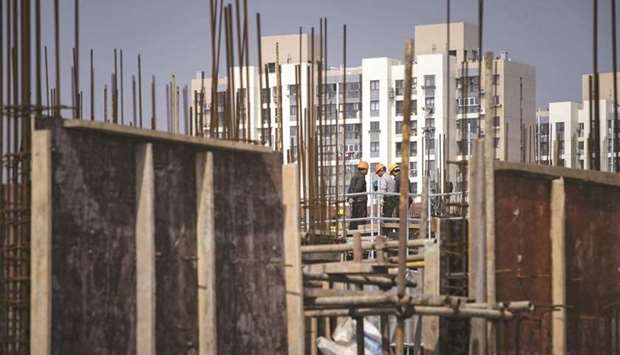Concerns about Yuzhou Group Holdings Co’s financial health are intensifying, after a profit warning from the Chinese property developer sent its bonds and shares tumbling this week.
The company’s Hong Kong-listed shares slumped a record 23%. It warned on Sunday that last year’s earnings likely dropped “significantly,” and then said on Thursday that it was barely profitable in 2020. Its dollar bonds have also fallen sharply, with an 7.85% note due 2026 plunging 31 cents on the dollar to 74.6 cents and poised for a record closing low, according to prices compiled by Bloomberg.
Moody’s Investors Service’s decision Tuesday to cut the midsized developer’s credit rating further weakened investor confidence at a time when China’s onshore defaults have hit a record high.
Property developers are among the firms most likely to be affected by a fresh government drive to deleverage. Corporate defaults have soared to 32.4bn yuan ($5bn) in March, set to be the highest monthly tally on record, according to data compiled by Bloomberg dating back to 2014. More than half of missed payments in the period came from the property sector.
What’s the company: Founded in the southern city of Xiamen in 1994, Yuzhou has since transformed itself into a national entity with dual-headquarters in Shanghai and Shenzhen. In a China Real Estate Information Corp list of China’s 200 biggest developers ranked by contracted sales, Yuzhou ranked 37th.
Yuzhou tapped international capital markets to help fund its expansion, with an initial public offering in Hong Kong in 2009. The developer is also a frequent borrower in the offshore debt market, with some $5.8bn in dollar bonds outstanding, Bloomberg-compiled data show.
What’s happening: The selloffs in Yuzhou’s stock and bonds deepened yesterday after the developer revealed in a late Thursday disclosure that it expects 2020 net income of about 117mn yuan, versus 3.61bn yuan a year earlier. As in Sunday’s filing, the company attributed its earnings weakness to pandemic-related delays on certain projects and national regulatory measures cooling selling prices.
The firm’s 8.5% dollar bond due 2023 also plunged 12 cents on the dollar to 88.6 cents as of 4:22 pm in Hong Kong, according to prices compiled by Bloomberg, while a 7.375% note due 2026 sank nearly 20 cents to 75.4 cents. Other high-yield Chinese developers saw their dollar bonds drop by as much as 1.5 cents, according to credit traders.
Equities in the sector also skidded, with Yuzhou closing down 14% in Hong Kong, making it the biggest decliner in the Hang Seng Composite Index. Fantasia Holdings Group Co dropped 9.6% and Kaisa Group Holdings Ltd fell 6.6%.
The company did not immediately respond to an e-mailed request to comment on its profit warning and rating downgrade.
Why does it matter: Moody’s downgrade will deepen investor worries about the broader real estate sector, as avenues of funding tighten amid Beijing’s push to rein in excessive debt expansion.
China Fortune Land Development Co became the nation’s first real estate firm to suffer a default in the dollar bond market since the government launched its “three red lines” directive. The introduction of those metrics for some firms weighed on the sector as a whole because they signal Beijing is going to keep clamping down on property companies’ borrowing.
On the basis of contracted sales, Yuzhou is bigger than China Fortune Land, which ranked 47th last year.
A debt binge by Chinese builders has been a driver of rising house prices, and signs of stress will be a concern to regulators keen on reining in excessive credit and shutting down insolvent borrowers.
What do ratings agencies say: Moody’s downgraded Yuzhou’s corporate family rating deeper into junk territory on Tuesday, cutting the grade to B1 from Ba3, citing uncertainty over its ability to deliver pre-sold projects on time as credit conditions in China tighten. Yuzhou’s rating outlook was also cut to negative from stable.
Moody’s also cited Yuzhou’s strong reliance on sales from joint ventures and associates that limits its corporate transparency. While the firm had sufficient internal resources to cover its maturing debt and committed land payments over the coming year, its key credit metrics are expected to stay weak over the next 12 to 18 months, according to the analysts.
S&P Global Ratings downgraded Yuzhou to B+ from BB- in April last year saying leverage was unlikely to recover over the next 12 months after it deteriorated in 2019, before withdrawing the rating at the issuer’s request a month later.
What are traders watching next: Investors are monitoring whether concerns over what appear to be signs of financial pressure at Yuzhou will spill over into the broader sector.
Yuzhou and its subsidiaries have $352mn outstanding on a dollar bond due May 11, and three onshore notes due August and September, data compiled by Bloomberg show. Its borrowing costs are set to rise following the downgrade, Bloomberg Intelligence analysts note. The firm tapped the offshore market for a $562mn green note in early January.
In the aftermath of the downgrade, Central China Real Estate Ltd’s dollar bond due 2025 tumbled to fresh lows since pricing in January. Some weaker Chinese dollar bonds have been under pressure in recent weeks as defaults in the sector surge.

Workers stand on a scaffolding at a construction site for a residential development on the outskirts of Shanghai. Concerns about Yuzhou Group Holdings Co’s financial health are intensifying, after a profit warning from the Chinese property developer sent its bonds and shares tumbling this week.
